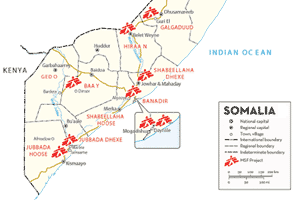As intense fighting continues in Mogadishu, Doctors Without Borders/Médecins Sans Frontières (MSF) is managing to curb the worst effects of an ongoing measles outbreak in neighboring regions.
The people in Guri El know that as soon as a child comes down with a high fever, red eyes, and tiny spots on the inside of the mouth, they need to isolate him or her from other children, immediately. Measles is a leading cause of death among children.
Since April, an outbreak of measles has been sweeping through the town of Guri El and nearby areas in the Galgaduud region of South and Central Somalia. So far, MSF has treated 403 patients for measles-related complications in the area.
The disease can cause serious effects, including blindness, encephalitis, severe diarrhea, and pneumonia. Normally, measles has the worst impact on small children. But, in this case, 60 per cent of patients have been older than five years–some are even adults. “The children under five have benefited from the systematic vaccination activities MSF has carried out in Istarlin Hospital over the past three years,” said Said Ibrahim Hassan, MSF’s field coordinator for the Galgaduud project. “Previous irregular vaccinations in the area might explain the high proportion of older children and adults affected.”
Treatment of complications
There is no cure for measles, but it is possible to treat or prevent potentially fatal or debilitating complications. This is particularly important in places with little access to healthcare and with widespread malnutrition, like Somalia.
The MSF-run Istarlin Hospital has added 10 beds in a separate building and dedicated staff for exclusive care of patients with severe measles complications. Less critical patients are cared for in an isolated part of the outpatient department.
Alternative approach
Many people in Galgaduud are nomads living scattered over a vast area and frequently on the move in search of water and fodder for their goats and camels. Along with the ongoing conflict, this makes it unrealistic to launch a major vaccination campaign in the area.
Instead, the MSF team has chosen an alternative: as well as treating patients with measles who are brought to the hospital, one mobile medical team is visiting villages and settlements daily up to 50 km (30 miles) from Guri El, to look for and treat infected people and to inform clan elders, religious leaders, teachers, and authorities to bring sick children to the hospital for care.
The mobile team adapts their itinerary according to where people move and where security permits. So far, the results are good. More than 40 percent of all measles cases treated have been treated in patients’ home towns. Only one child is reported to have died due to measles in the area.
“The information that we have suggests a mortality rate lower than might be expected,” said Hassan. “We believe that actively looking for cases, visiting the villages to treat patients and involving the communities have helped a lot.”
Measles in other areas
Nearby regions are also feeling the affects of the epidemic.
In the last two weeks of April MSF teams vaccinated more than 16,000 children between six months and 15 years old in Belet Weyne, in the Hiraan region just south of Galgaduud. In Galkayo, in Mudug region, and teams have treated more than 230 patients from mid-April to mid-June. Security conditions affect how and where MSF can work and explain the different approaches to managing the measles outbreak.
Currently MSF is looking at possibilities to launch a major vaccination campaign in the camps along the road between Afgooye and Mogadishu, where hundreds of thousands of people have sought refuge due to the recent escalation of violence in Mogadishu.
MSF delivers health care in eight regions in South and Central Somalia based on medical need and regardless of clan or political affiliation.
In 2008 MSF teams provided nearly 730,000 outpatient consultations, including more than a quarter of a million for children under five. 24,000 people were admitted as inpatients to MSF-supported hospitals and health clinics, and close to 4,000 surgeries were performed, 1,249 of which were for injuries caused by violence. Nearly 35,000 people suffering from malnutrition were provided with food and medical care. For its work in Somalia, MSF does not accept funding from any government or donor agency, and relies solely on donations from the general public.





